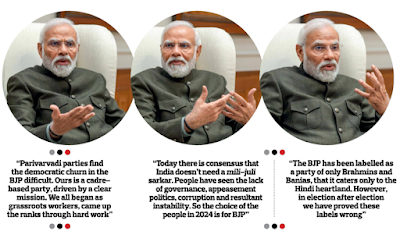India Today’s own Narendra Modi
India Today to Narendra Modi: What about creation
of jobs?
Narendra Modi: As for creation of jobs, it has been
the topmost priority of my government. All our efforts have been geared to this
task.
The above question-answer is from India Today’s
latest edition, which is an out and out eulogy to Narendra Modi who is given the
Newsmaker of the Year Award by the weekly.
Now let’s look at a news item from India Today’s
website: A
Romanian flight carrying 276 Indian passengers landed in Mumbai early on
Tuesday after being grounded in France four days ago over suspected human
trafficking.
It was not human trafficking. It was a whole airplane
of people leaving India illegally but voluntarily to find jobs in the
USA or Canada or any country better than Modi’s India. Ironically, most of
these ‘illegal’ jobseekers are from Modi’s own Gujarat which he claims in the India
Today interview as the state made ideal by him. “When I became chief
minister of Gujarat in 2001, the size of its economy was around $26 billion (Rs
2.17 lakh crore). When I left Gujarat to become the prime minister, the size of
Gujarat’s economy had become $133.5 billion (Rs 11.1 lakh crore).” Modi claims
that in the India Today interview. He goes on to make a similar
claim about India’s economic progress after he became the PM.
If India is indeed making all that progress which the
PM claims in the India Today interview, why are millions of
Indians choosing to leave the country and live abroad doing even menial
jobs? Hundreds of thousands of Indians
are even giving up their Indian citizenship in order to be able to work abroad.
Where is the ‘connect’ between Modi’s claims in the India Today
interview and the ground reality in the country?
India Today has chosen Modi as the Newsmaker of the Year. They have dedicated the last issue of the year to Modi. Almost the entire magazine is about Modi. There is a long - very long, in fact - article that lists Modi’s achievements with ample details. The senior journalist of India Today has done a great job to project Modi as “The Reformer,” “The Builder,” “Messiah of the Poor,” “The Vishwa Guru,” “Master Strategist,” and so on. I’m not listing all of the epithets used by India Today, which has put up no less than 24 scintillating photographs of Narendra Modi in this one volume.
The interview was conducted by India Today’s
owners, Aroon Purie and his daughter Kallie Purie. The father and daughter know
their business, if not their job. Senior journalist of the magazine, Raj
Chengappa, was also part of the interview team. It is he who wrote a long
panegyric to Modi as the lead article of the issue. When you read the article
and the following interview, it will be clear to you that all questions and
answers were ready long before the interview was conducted. Probably the
interview was just a chai
per charcha and a photo session. Yet another of those well-known Modi
gimmicks.
Let Modi keep spending money on propaganda. He will definitely win the next Lok Sabha elections. He will be India’s PM yet again. And India will become a Hindu Rashtra. The minorities in India will suffer the same fate as the minorities in Pakistan and Afghanistan. That is, Modi will make another Pakistan of India. We become like our enemies, some writer said. Modi will prove that statement’s veracity yet again. Some silly people will think that history is avenged. A few, very few, intelligent people will know the truth: the masses are easy to be fooled. Endlessly. Magazines like India Today will go on eulogising the ruler even if the party changes, the ideology changes, whatever changes… the Puries just want to laugh all the way to their banks.



Hari OM
ReplyDelete"The Press" has been guilty of influence (and being influenced) by politics since ever it developed. I despair at the possility of there ever being anything like unbiased news. It is a near impossibility. But one can at least hope for alternate points of view, some counterpoint and balance... clearly none present here! YAM xx
If the press tries to be unbiased Modi won't let them survive. He knows every strategy possible for keeping enemies away, real or perceived.
DeleteLooming tragedy
ReplyDeleteUndoubtedly, especially when he will come back next year with a bigger majority.
DeleteToo many in the press are more interested in access than journalism. And too many are beholden to monied interests so much so that they don't even try to dig deeper on pressing issues.
ReplyDeleteSome rulers make it impossible for the press to be honest.
DeleteIt honestly boggles my mind that every other day we hear about N number of people leaving India, and still nobody wants to question it !?! Insane how foolish we've become!
ReplyDeleteProbably India has learnt about the futility of raising certain questions.
Delete